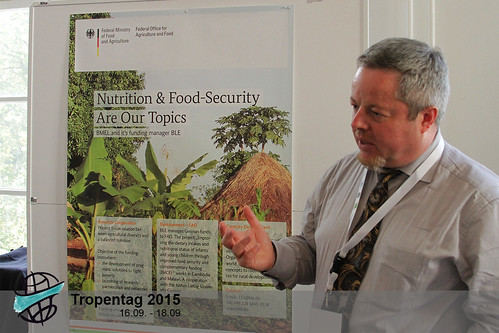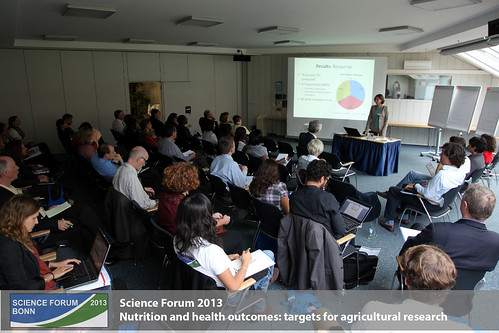Nutrition
Malnutrition in Africa: Oh, the Irony!
Fri, 09/22/2017 - 12:05 — lizkusiaIt is 8:00 a.m. and I am already at the Agrobiodiversity and Nutrition diversity poster session. Today, I am doubling as a student reporter and a poster presenter. The room is filled with enthusiastic faces, hungry for information on the topic. The session started on high note with a presentation on potato farming in Peru. However, something caught my eye throughout the presentations. All the other topics, including mine were about Africa. One of the speakers swept me away with his research on biofortification of cassava. This is good news! However, allow me to talk about the other side of the story.
"Nutrition & Food Security are Our Topics"
Sat, 09/19/2015 - 11:18 — Philip TestroetI talked to Mr Siegfried Harrer of the Federal Office for Agriculture and Food (BLE) – an office that is subordinate to the Federal Ministry of Food and Agriculture (BMEL) with German Federal Minister for Food and Agriculture Schmidt. BMEL is one of the donors of Tropentag 2015. Harrer said that BMEL is spending 8.5 million Euros on 8 different science projects this year. The main interest of BLE being at Tropentag is to get in contact with other organizations and researchers. They organize workshops for local farmers around the world. Furthermore they have upcoming possibilities for young scientists from developing countries to get grants. 
How soon do you want to die? It´s up to you!
Thu, 09/26/2013 - 09:46 — Viviane MeyerFood for Thought: Do Agricultural Innovations Improve Our Health?
Tue, 09/24/2013 - 17:28 — Vince Canger The Science Forum 2013 in Bonn, Germany, Discusses the Links between Agriculture and Health and how they can be Improved
Imagine for a moment that you're a small-scale farmer from a poor region and you grow a number of crops. Some of the crops you sell for cash which you probably use to purchase other foods you don't grow yourself, or to pay for other family expenses. The food you don't sell, you eat. But you later decide to start growing a high-yielding cotton variety with a good market demand. Your new choice in crop brings you greater income which you then use to purchase a wider range of healthier, more nutritious foods that you may not have had access to before. Such a scenario makes sense, unless you consider the contradicting evidence currently coming from research in China. (read more)
The Science Forum 2013 in Bonn, Germany, Discusses the Links between Agriculture and Health and how they can be Improved
Imagine for a moment that you're a small-scale farmer from a poor region and you grow a number of crops. Some of the crops you sell for cash which you probably use to purchase other foods you don't grow yourself, or to pay for other family expenses. The food you don't sell, you eat. But you later decide to start growing a high-yielding cotton variety with a good market demand. Your new choice in crop brings you greater income which you then use to purchase a wider range of healthier, more nutritious foods that you may not have had access to before. Such a scenario makes sense, unless you consider the contradicting evidence currently coming from research in China. (read more)




